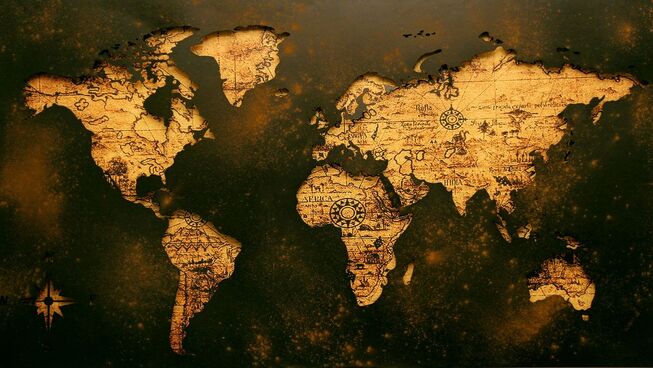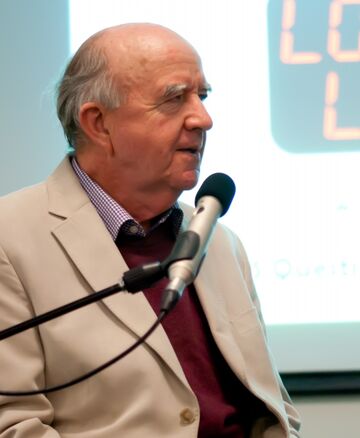
A guest post by Peter Adam, former Principal Ridley College, reflecting on National Reconciliation Week
It was theft on a very large scale. It was a theft that began in 1788, when the First Fleet arrived at Botany Bay. It was the theft of a land, a great island, a continent. For the British government stole the land of Australia. It justified large scale theft by a variety of arguments. The land was not cultivated in European style, so therefore empty land: under-utilised, and so ripe for the picking. It was partly a race for empire, partly a solution to the problem of too many people to fit into British gaols, and partly the desire for commercial profit. Here was theft on a grand scale.
But it was not an empty land, it was inhabited. It was not uncultivated. Bill Gamage has shown us that it was ‘the Biggest Estate on Earth'1 , carefully, expertly, and effectively cultivated in a way that reflected both a common method across this vast land, adapted to local environments: a common method that both used and protected the land. Well, as Augustine, Bishop of Hippo wrote in the last days of the Roman Empire: ‘All empire is theft’. The Government of Australia said sorry for the stolen generation, and quite right too. We have not yet said sorry for stolen land.
How did people at that time view what had happened? Watkin Tench, a marine who was on the First Fleet, lived in the colony at Sydney Cove from 1788-92. He wrote of the natives,
When they met with unarmed strangers they sometimes killed and sometimes wounded them. I confess that, in common with many others, I was inclined to attribute this conduct to a spirit of malignant levity. But a farther acquaintance with them, founded on several instances of their humanity and generosity…has entirely reversed my opinion and led me to conclude that the unprovoked outrages committed upon them by unprincipled individuals among us caused the evils we had experienced.2
But the unprovoked outrages committed by unprincipled individuals only reflected on a small scale the great unprovoked outrage committed by an unprincipled Empire, the whole-scale theft of Australia.3 The English author, William Howitt, gave his enlightened view, so different from most of his contemporaries, in 1838:
We have now followed the Europeans to every region of the globe and seen them planting colonies and peopling new lands, and everywhere we have found them the same—a lawless and domineering race, seizing on the earth as if they were the first-born of creation, and having a presumptive right to murder and dispossess all other people …Many are the evils that are done under the sun; but there is and can be no evil like that monstrous and earth-encompassing evil which the Europeans have committed against the Aborigines of every country in which they settled.4
But the actions of the British in the case of Australia were unusually bad, because whereas in other instances they respected the property rights of the people when they took over land, this did not happen in Australia. All land rights were abolished, ignored, trampled on, extinguished. It was so bizarre, because many of the convicts were guilty of theft, but here was theft on a massive scale. Most of the convicts brought here by the British government were thieves.5 They may not have stolen very much, but the Government of the day decided that stealing was wrong, and such a serious offence, that it justified transporting men, women and children half way around the world to penal colonies here in Australia. This was extreme punishment for relatively minor crimes. But the government of the day regard property as sacred, and so imposed great penalties for theft. And the reality was that the British government not only stole the land, but also then allowed avaricious individuals to take and possess land, land stolen from the original inhabitants. And what grotesque behaviour, what extraordinary moral blindness, to regard stealing a few handkerchiefs as such a serious crime that it justified sending the perpetrator half way around the world to a penal colony, and yet to steal a continent from its indigenous people in order to establish that penal colony!
The doctrine of terra nullius treated people as if their existence had no meaning. But we Europeans coveted space for a penal colony, new land, new opportunities, and great wealth. We coveted, stole, and murdered.
The Bible not only describes our failure, it also tells us what to do about our failure, and how to minimise the bad consequences of our failure for others and for ourselves. For example in 1 John:
But if we walk in the light, as he is in the light, we have fellowship with one another, and the blood of Jesus, his Son, purifies us from all sin. If we claim to be without sin, we deceive ourselves and the truth is not in us. If we confess our sins, he is faithful and just and will forgive us our sins and purify us from all unrighteousness [1 John 1:7-9].
While those who took over the land hurt its inhabitants, in doing so they sinned against God. For God had said, ‘you shall not covet’… ‘you shall not steal’ …’you shall not murder’ [Exodus 20:13-17]. Our first duty is to confess our sin to God. While none of us were alive at that time, we all benefit from their actions. We should at least confess the sin of ignoring that sin, of thoughtlessly benefiting from it, and of failing to think who we should act in relation to the descendants of those who suffered.
Ultimately Australia belongs to God and to Christ. Our greatest sins are not against each other, but against God. We are all custodians of our lives, and custodians who are finally responsible to God for our stewardship. For the first fundamental reality about this world is that God made it through his Son, who later came to earth as Jesus of Nazareth, in whom all the fullness of God was pleased to dwell.
We mar and spoil each other and our world in many different ways. Our great dignity and responsibility as humans made in God’s image means that we can do great damage, as well as great good. It means that we can do damage unintentionally as well as intentionally, and we can get caught up in great human movements that cause damage beyond our imagining. Our shared sins cast long shadows, and the sins of other from which we benefit may also cast long shadows.
But God sent his Son, the Lord Jesus Christ to reconcile to himself all things, by making peace through the blood of his cross. Christ came to reconcile us to God, to end the enmity between us, to bring peace by his blood shed on the cross. Jesus died to bring us to God. We can come to God even now: it is not too late. We can come to God now: he is not too far away. We can come to God now: he invites and welcomes to himself through his Son Jesus, and through his death in our place on that cross two thousand years ago.
References
[1] Bill Gamage, The Biggest Estate on Earth: How Aborigines made Australia, Sydney, Allen and Unwin, 2011.
[2] Tim Flannery, ed, Watkin Tench’s 1788, Melbourne, Text Publishing, 2009, p. 91.
[3] In fact Great Britain was not formally an Empire until 1876, when Queen Victoria was made Empress of India. But through acquisition of other countries for trade and commercial gain, it had gained control of lands in many places. It was in fact a commercial empire.
[4] William Howitt, Colonization and Christianity: a popular history of the treatment of the native by the Europeans in all their colonies, London, Longman, 1838, pp. 499–501.
[5] Geoffrey Blainey, A Land Half Won, Revised Edition, Sydney, Sun, 1992, pp. 30-48.
Photo by Aaditya Arora from Pexels


